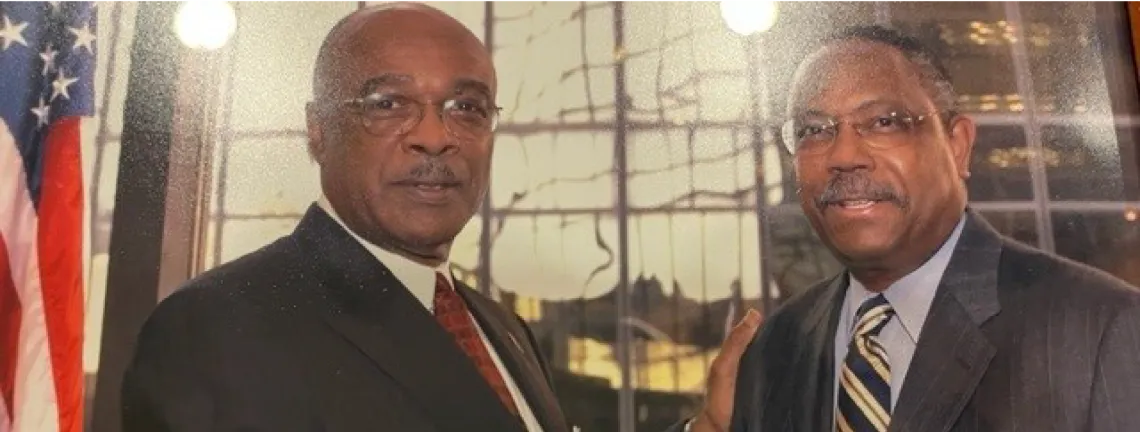Honoring Family Paves Way for Future Pharmacists

From left, Former U.S. Secretary of Education Rod Paige shakes hands with Dr. James Pughsley, an alumnus of the University of Arizona who recently established a scholarship endowment in honor of his cousin, Charles Kendrick, the first Black in-state graduate of the College of Pharmacy.
Motivated by a deep-rooted connection to his family and a desire to preserve their legacy, Dr. James Pughsley established a scholarship endowment within the R. Ken Coit College of Pharmacy in honor of his cousin Charles Kendrick, the first Black in-state graduate of the College.
Kendrick worked at Pima County Hospital – today Banner-University Medical Center South – for 42 years, including 18 as the outpatient pharmacy supervisor. He and a late friend named Shadrick Blair, founded and opened the Afro-American Heritage Museum on Tucson’s South Park Avenue in 1998. Today, the museum is shown to the public by appointment only but is being reworked to become the Tucson Center for Black Life.
Dr. Pughsley’s connection to education and family history were the factors behind his decision to establish the Charles E. Kendrick Scholarship Endowment within the College.
“Charles deserves to be remembered,” Dr. Pughsley said. “People need to know about the journey he traveled, and this scholarship endowment helps lift his story up so that his purpose goes beyond what he initially thought he was serving.”
Having established roots in Tucson when their families migrated in the early 1930s, Dr. Pughsley and Kendrick formed a strong bond growing up on Tucson’s South Park area.
“I remember him riding his bike up South Park to go to school at the University of Arizona,” Dr. Pughsley said. “There was one summer when my grandparents left me in his care and he would always drop in on me – so we both got to know each other very well.”
As Dr. Pughsley got older, Kendrick allowed him to work in his small grocery store to stay out of trouble and earn some pocket change by stocking store shelves.
“He has always been like a brother to me,” Dr. Pughsley said. “He would cheer me on and encourage me to get a higher education.”
Dr. Pughsley took his cousin’s advice.
He earned his bachelor’s degree from Northern Arizona University and his masters and doctorate in Educational Administration from UArizona.
His passion for education came from Dr. Laura Nobles Banks-Reed, a UArizona alumna and a public schools pioneer in Tucson. Her influence led Dr. Pughsley on a career stretching 40 plus years.
He started teaching in the Clark County School District in Las Vegas where he spent 27 years and rose to the position of Associate Superintendent. From there, he held superintendent level positions in several school districts throughout the South and Southeast, including Louisiana, Virginia, and North Carolina.
He also served as the executive director of the Darden/Curry Partnership for Leaders in Education at the University of Virginia, where he also served as a visiting professor at the Darden School of Business. In 2003, Dr. Pughsley was named the National Superintendent of the Year by the National Alliance of Black School Educators.
Throughout his career, he promoted academic excellence, equity, and improved the quality of teaching in the classroom. His dedication to education is among the reasons he established the scholarship endowment.
“I would like Charles to get the recognition but it’s also to help those students who share a similar experience like Charles and myself,” Dr. Pughsley said. “I’d like for those students to benefit, not only in terms of inspiration, but also with financial support for when they find the road difficult financially.”
He also hopes the students who receive the scholarship will find themselves in a position financially to give back themselves and help support future students on their journey to becoming a pharmacist.
“When I shared the news with Charles, I could just tell by the pitch in his voice that he was appreciative,” Dr. Pughsley said. “I wanted to honor Charles and I couldn’t think of a better way to do it that would last a lifetime.”

